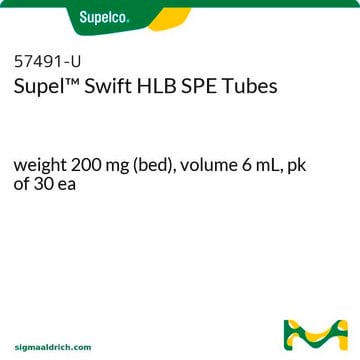66825-U
BIOshell A400 Protein C4 (3.4 μm) HPLC Columns
L × I.D. 10 cm × 2.1 mm, HPLC Column
Sinónimos:
Protein C4 Reversed-Phase Chromatography Column
About This Item
Productos recomendados
product name
BIOshell A400 Protein C4, 3.4 μm HPLC Column, 3.4 μm particle size, L × I.D. 10 cm × 2.1 mm
material
stainless steel hardware
Quality Level
agency
suitable for USP L26
description
Shell thickness (0.2 μm)
Solid Core (3.0 μm)
product line
BIOshell
feature
endcapped
manufacturer/tradename
BIOshell
packaging
1 ea of
extent of labeling
0.4% carbon loading
parameter
600 bar max. pressure
90 °C max. temp.
technique(s)
HPLC: suitable
LC/MS: suitable
UHPLC-MS: suitable
UHPLC: suitable
L × I.D.
10 cm × 2.1 mm
surface area
15 m2/g
surface coverage
4.2 μmol/m2
matrix
spherical silica particle platform
superficially porous particle
matrix active group
C4 (butyl) phase
particle size
3.4 μm
pore size
400 Å
operating pH range
2-9
separation technique
reversed phase
¿Está buscando productos similares? Visita Guía de comparación de productos
Categorías relacionadas
General description
Legal Information
guard cartridge
related product
Elija entre una de las versiones más recientes:
Certificados de análisis (COA)
¿No ve la versión correcta?
Si necesita una versión concreta, puede buscar un certificado específico por el número de lote.
¿Ya tiene este producto?
Encuentre la documentación para los productos que ha comprado recientemente en la Biblioteca de documentos.
Artículos
Optimization of a Reversed-Phase Liquid Chromatographic (RP-LC) method for the intact analysis of a therapeutic monoclonal antibody, trastuzumab, using a BIOshell™ A400 Protein C4 column.
The article describes the use of difluoroacetic acid (DFA) as an effective alternative to acid modifiers, formic acid (FA) and trifluoroacetic acid (TFA) in the LC-UV/MS analysis of proteins.
A RPLC-MS workflow for mass analysis of reduced monoclonal antibody, trastuzumab, including reduction procedures, calibration, and system suitability tests.
A RPLC-MS workflow for mass analysis of non-reduced monoclonal antibody, trastuzumab, including calibration, and system suitability tests.
Protocolos
Larger porous shell particles in BIOshell™ columns improve efficiency in U/HPLC analysis of peptides and proteins.
BIOshell™ IgG 1000 Å C4 UHPLC Column for Improved Biomacromolecule Separations
HPLC Analysis of the Monoclonal Antibody (mAb) Erbitux (Cetuximab) on BIOshell™ A400 Protein C4
Contenido relacionado
La cromatografía de líquidos de alta resolución (HPLC) puede utilizarse para separar e identificar diferentes biomoléculas grandes, como proteínas y péptidos, en una muestra. Se basa en el bombeo de una muestra con un disolvente (fase móvil) a través de una columna rellena con material absorbente (fase estacionaria) a una presión elevada.
HPLC separates and identifies large biomolecules like proteins and peptides by pumping the sample through a sorbent-packed column.
Nuestro equipo de científicos tiene experiencia en todas las áreas de investigación: Ciencias de la vida, Ciencia de los materiales, Síntesis química, Cromatografía, Analítica y muchas otras.
Póngase en contacto con el Servicio técnico




